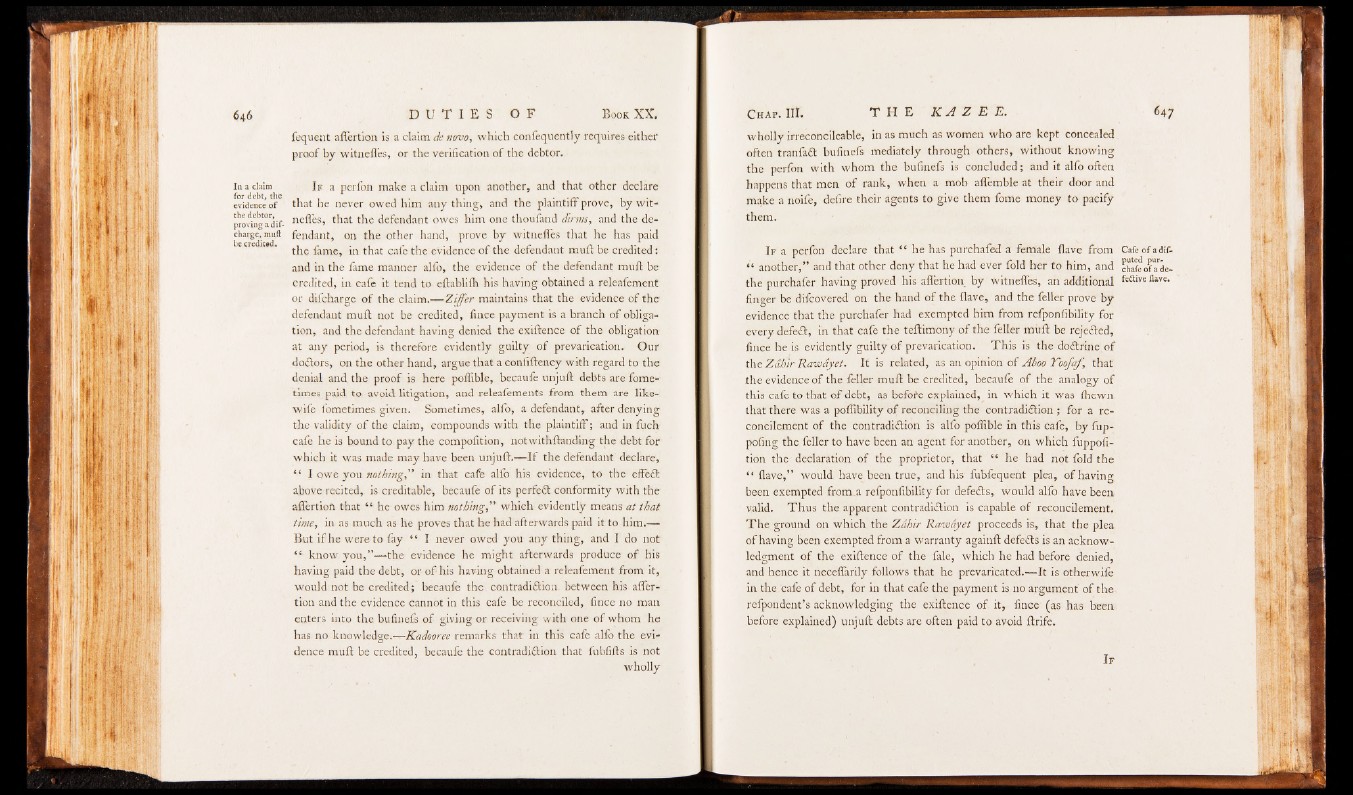
In a claim
for debt, the
evidence o f
the debtor,
proving a dif-
charge, mull
be credited.
fequent aflèrtion is a claim de novo, which confequently requires either
proof by witnefi'es, or the verification of the debtor.
If a perfon make a claim upon another, and that other declare
that he never owed him any thing, and the plaintiff prove, by witneffes,
that the defendant owes him one thoufand dirms, and the defendant,
on the other hand, prove by witneffes that he has paid
the fame, in that cafe the evidence of the defendant mull: be credited:
and in the fame manner alfo, the evidence of the defendant mull be
credited, in cafe it tend to eftablifh his having obtained a releafement
or difcharge of the claim.— Ziffer maintains that the evidence of the
defendant mull not be credited, fince payment is a branch of obligation,
and the defendant having denied the exiftence of the obligation
at any period, is therefore evidently guilty o f prevarication. Our
doctors, on the other hand, argue that a confiftency with regard to the
denial and the proof is here poffible, becaufe unjuft debts are fome-
times paid to avoid litigation, and releafements from them are like-
wife fometimes given. Sometimes, alfo, a defendant, after denying
the validity of the claim, compounds with the plaintiff; and in fuch
cafe he is bound to pay the compofition, notwithftanding the debt for
which it was made may have been unjuft.— I f the defendant declare,
“ I owe you nothing,” in that cafe alfo his evidence, to the effedt
above recited, is creditable, becaufe of its perfedl conformity with the
aflertiofi that “ he owes him n o th in g which evidently means at that
time, in as much as he proves that he had afterwards paid it to him.—
But if he were to fay “ I never owed you any thing, and I do not
“ know you,”— the evidence he might afterwards produce of his
having paid the debt, or of his having obtained a releafement from it,
would not be credited; becaufe the contradidlion between his affer-
tion and the evidence cannot in this cafe be reconciled, fince no man
enters into the bufinefs of giving or receiving with one of whom he
has no knowledge.— Kadooree remarks that in this cafe alfo the evidence
muft be credited, becaufe the contradidlion that fubfifts is not
wholly
wholly irreconcileable, in as much as women who are kept concealed
often tranfacl bufinefs mediately through others, without knowing
the perfon with whom the bufinefs is concluded; and it alfo often
happens that men of rank, when a mob affemble at their door and
make a noife, defire their agents to give them fome money to pacify
them.
If a perfon declare that “ he has purchafed a female {lave from Cafeofadif.
“ another,” and that other deny that he had ever fold her to him, and chafe of a^de-
the purchafer having proved his affertion by witneffes, an additional fe£live flave"
finder be difcovered on the hand of the flave, and the feller prove by
evidence that the purchafer had exempted him from refponfibility for
every defedt, in that cafe the teftimony of the feller muft be rejedted,
fince he is evidently guilty of prevarication. This is the dodlrine of
the Zdhir Rawayet. It is related, as an opinion of Aboo Toofaf, that
the evidence of the feller muft be credited, becaufe of the analogy of
this cafe to that of debt, as before explained, in which it was fliewn
that there was a poflibility o f reconciling the contradidlion ; for a reconcilement
of the contradidlion is alfo poffible in this cafe, by fup-
pofing the feller to have been an agent for another, on which fuppofi-
tion the declaration of the proprietor, that “ he had not fold the
“ flave,” would have been true, and his' fubfequent plea, of having
been exempted from.a refponfibility for defedts, would alfo have been
valid. Thus the apparent contradidlion is capable of reconcilement.
T h e ground on which the Zdhir Rawdyet proceeds is, that the plea
of having been exempted from a warranty againft defedls is an acknowledgment
of the exiftence of the fale, which he had before denied,
and hence it neceffarily follows that he prevaricated.— It is otherwife
in the cafe of debt, for in that cafe the payment is no argument of the
refpondent’s acknowledging the exiftence of it, fince (as has been
before explained) unjuft debts are often paid to avoid ftrife.
I f